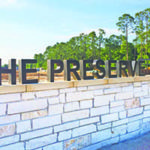This is the 11th in a series of articles that celebrates the lives of the Nobel Prize laureates whose names grace the 125 streets of Laureate Park. These laureates are extraordinary individuals who through their lifetime achievements have made our daily lives immeasurably richer, often in ways not readily evident.
Switzerland, without a doubt, is the opposite of Florida. The Sunshine State is uniformly flat; Switzerland is anything but. Floridians are known to be fun-loving, chatty partygoers, while the many admirable qualities of the Swiss do not necessarily extend to sociability with strangers. One Swiss quality, though, honed to an exceptionally high standard by Swiss banks, is an uncanny expertise at keeping secrets. It is said that, in parts of Switzerland, you may work with a colleague in the same office for decades and never meet his or her spouse, or even know if there is a spouse. In contrast, you might learn the details of a Floridian’s biography 10 minutes after introducing yourself. As physicists remind us, opposites often attract, and judging from the frequency that mountains and snow decorate the Facebook profile pages of Lake Nona residents, it is tempting to conclude that Floridians are drawn to places that are not exactly flat and fiery, but rather steep and snowy.

Sometimes, though, opposites do not attract. Examples that come to mind are quarks and antiquarks, which annihilate one another; Red Sox and Yankees fans, who sometimes try their best to annihilate one another; and, well, histamines and antihistamines. It was this latter pair of natural enemies that ignited the curiosity of the eminent Swiss chemist, Daniel Bovet (pronounced Bo-VEH), as he worked in the 1930s to develop synthetic antihistamine compounds, an accomplishment that won him both the 1957 Nobel Prize in medicine and the heartfelt gratitude of anyone with a runny nose.
Bovet spent his early years happily talking in his native tongue, Esperanto, in Fleurier, a town nestled against a range of low mountains of the French-speaking Swiss Jura. (Our neighborhood’s Esperanto speakers can double check this at the Vikipedio website.) In 1929, after obtaining his doctorate in zoology and comparative anatomy from the University of Geneva, where his father, the Esperanto enthusiast, was a professor of experiment education, Bovet started a job as a researcher in therapeutic chemistry at the Pasteur Institute in Paris. There, his attention turned to pharmacology as he focused his intellectual energies on the chemical composition of histamines and, more importantly, compounds that could counteract their effects on the human body. Bovet’s breakthrough came in 1937 when he successfully synthesized the first chemical compounds that could act as an antihistamine.

In the 1950s, Bovet’s attention pivoted to curare, a poison used by the indigenous natives of Brazil and Venezuela, including the Yanomami, in hunting large prey. Bovet’s field studies in the jungles of South America led him to discover that although large doses of curare are deadly, smaller doses have the effect of relaxing muscles. Back home, Bovet’s analysis of the chemical properties of curare enabled him to develop hundreds of synthetic versions of the substance that were later developed into drugs for use in abdominal surgery.
Near the end of his career, Bovet made a bizarre professional detour as he chaired a study team that concluded that smoking cigarettes improves human intelligence. (In my recollection, the tobacco industry never employed this intriguing argument in defense of smoking.) In photos found online, Bovet can be seen clutching a cigarette next to his wife, Filomena Nitti, the daughter of the prime minister of Italy following World War I and an accomplished bacteriologist herself, who co-authored several scholarly papers with her husband. Bovet and Nitti, though, maintained a Swiss shroud of secrecy surrounding their family life. Despite obtaining citizenship in Italy, that land of extroverts, Bovet remained reserved, and current websites about his life and work uniformly concede that “not much is known about Bovet’s personal life.”
In the late 1980s, my wife, Elizabeth, and I moved into an apartment in a small town just north of Bern, the capital of Switzerland, where our daughter was born 10 months later. Though the apartment was small, our bedroom boasted of a large picture window through which we followed the colorful scenes of Swiss daily life, in a panorama of fields and farmhouses, trains and autoroutes, framed in the distance by the low wall of the Jura Mountains. Directly below our window was a potato field, and one morning, we woke up to find a hot-air balloon settling on the ground just a few feet away, right in our backyard. In the distance to the left, beyond the Röstigraben (literally the “Fried Potato Trench,” rösti potatoes being the favored dish of German-speaking Swiss) separating the nation’s French and German speakers, we could look toward Daniel Bovet’s hometown of Fleurier. We Floridians, including the new arrivals to the Sunshine State among us, may yearn for the snowy slopes of Switzerland, but, to be honest, other qualities of the Swiss life should be more deserving of our admiration. To cite just one of these, let’s consider that Daniel Bovet obtained no financial gain for the scores of medications he developed throughout his life, nor did he even file patents for his discoveries. Shouldn’t we only wish that there were more of such selfless developers of drugs in this country?

Next month: Howard Temin, Retrovirus Rebel
Dennis Delehanty moved to Laureate Park with his wife, Elizabeth, from the Washington, D.C., area in mid-2018. Dennis loves his new neighborhood and is optimistic that Google Maps will one day learn how to pronounce Bovet Avenue correctly. You can contact Dennis at donnagha@gmail.com.


